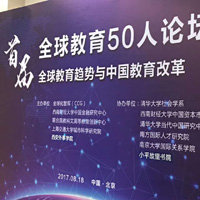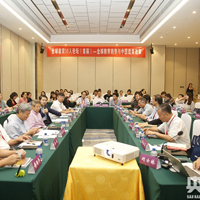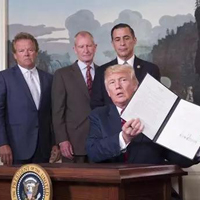- 当前位置:
- 首页>
- 活动>
- ���������������
���������������
CCG持续关注国际关系议题,推动中国与全球化的发展,积极开展国际交流,充分发挥智库“二轨外交”作用,在巴黎和平论坛、达沃斯世界经济论坛、慕尼黑安全会议等重要国际政策与意见交流平台上组织分论坛、边会、圆桌会议、晚宴等活动,促进国际政商学界对话,凝聚共识;CCG积极与各国政界、智库界、工商界开展“二轨外交”活动,每年常态化赴多国调研与交流,促进中外关系攸关方互动,保持与多国政策圈层的沟通渠道。
-

【中国社会科学报】全面提升中国教育理论影响力
“预计到2030年,中国将成为世界教育中心之一。”8月18日,在全球化智库、西南财经大学中国金融研究中心等单位主办的首届全球教育50人论坛上,国家教育发展研究中心教育发展战略研究室主任高书国如此表示。 高书国将中国教育发展分为跟跑、并行、领跑三个阶段。国家教育发展研究中心的一项跟踪研究显示,1950年,中国人均受教育年限仅相当于美国的11.9%,2030年则可能达到美国同期人均受教育年限的92.2%。而且由于中国人口基数大,大约有六七亿中国人将超过美国人的平均受教育水平。“2030年我国将成为教育强国,同时进入人力资源强国行列。” “要对中国教育充满自信,我们在很多方面可以引领世界。”西安外事学院校长陈爱民在对比中美教育特点时表示,中国集中力量办大事的体制优势,在推动教育发展方面也彰显出强大力量。在中央部署下,全国高校能够朝一个方向努力,共同争创“双一流”。 在谈到中国未来如何建设教育强国时,高书国认为,要构建与中国大国地位相适应的开放教育体系,建立更多的与全球教育体系的联系和纽带关系;成为世界教育改革和发展的引领者,在教育思想、教育改革、教育质量等多方面影响世界;建设世界一流的现代化教师队伍,面向发展中国家等打造国际教师的培训中心;推进教育的双向国际化,积极参与国际学生评估项目等世界性教育质量评估;全面提升中国教育理论和模式的影响力。 在南开大学金融发展研究院教授田利辉看来,高等教育的发展水平是国家发展水平、发展潜力的重要标志,中华民族的伟大复兴离不开中国高等教育的大发展。而中国高等教育的大发展亟须本土原创性理论的指导,对西方教育理论和经验可以借鉴,但绝不能盲目照搬、亦步亦趋。要从中国的实践出发,思考怎样做科研、教什么书、育什么人。(记者毛莉)文章选自《中国社会科学报》,2017年8月23日
2017年8月24日 -

【央广网】教育全球化成为新潮流 专家:我们需要对教育重新反思
首届“全球教育五十人论坛”举办 央广网北京8月21日消息(记者 张佳琪)18日,中国全球化智库(CCG)、西南财经大学中国金融研究中心、联合国教科文高等教育创新中心、小平故里书院联合举办了首届“全球教育五十人论坛”,教育界专家云集清华,一同探索全球教育未来、献策全球化背景下的中国教育改革。 教育全球化愈发明显 我们需要对教育重新反思 面对当今教育的国际新形式,国务院参事、欧美同学会副会长、全球化智库(CCG)理事长王辉耀提出了四点主张:重视教育已经成为全球的潮流;教育的全球化日趋明显,跨国留学增长成为新的趋势;教育与互联网的结合越来越紧密,同时给教育带来深层次的改革;教育阶段化被教育终身化代替。 如今,随着经济快速发展,中国参与全球化的程度也越来越深。清华大学全球共同发展研究院常务副院长李强表示,我国的经济上了一个大台阶以后,民众对于教育的需求发生了重大变化。现在的问题是我们教育还没有办法满足民众的教育。我们可能需要对教育重新反思了,到底培养什么样的人,怎么培养人。其中存在两个环节,一个是国内层面,就是经济上了一个台阶以后怎么办教育;二是国际层面,在激烈竞争的全球化背景下,中国教育该怎么办。 加强去行政化力度 对人才培养方式进行改革 “我们要大力发展中国教育,推动高等教育的本土化、多元化和师范化,让中国高等教育为世界经济的全球化做出贡献。”南开大学金融发展研究院田立辉教授表示。 西安外事学院教授陈爱民谈到中国教育的发展方向,认为中国教育需要虚心学习的态度,需要培养自信。但是教育也受到公办高校行政化系统的限制,所以去行政化是必要的。另外,陈爱民还表示,在中国尊重专家、尊重学术、尊重老师的氛围仍旧不及世界水平。所以需要十年磨一剑的工夫,以严谨的学术态度和学术氛围来发展中国教育事业。 教育部教育发展研究中心战略室主任、研究员高书国则谈到,中国教育在全球化的过程中,应该不断提升自身影响力和分量。他分析,“中国的宏观教育发展趋势经历三个阶段:跟跑阶段、并行阶段、领跑阶段。我们从穷国办大教育,到大国办大教育,到强国办强教育,到教育强国世界教育中心,100年间我们要经历4个阶段”。 身处不同阶段,教育改革的重点也在不断变化。对于如今所处的阶段,天津财经大学副校长刘金兰认为,目前我国需要对人才培养方式进行改革。“要办成中国高等教育的强国,具体体现在三个方面。首先需要从人才培养的理念上进行更新,其次人才培养的路径设计上要进行优化。另外,在人才培养手段落实上,需要我们有一些实际的做法。”刘金兰强调。 搭建立体化的互联网教学环境 做到“思维的融合创新” 如今,随着互联网技术的普及,教育形式也在随之改变。山东大学副校长胡金焱表示,迎接“互联网+”时代的到来,应以信息化作为载体,推进教育教学改革,搭建立体化的教育教学环境,只有这样才能符合互联网的发展态势和趋势, 而新时代下的学习方式,则和曾经亦大不相同。“无论美国、中国,任何一个国家,学习都是共同的问题,如果学习是高效的,成长就会越来越快;如果学习是低效的甚至是错误的,人的成长就会越来越慢。”海南大学副校长傅国华分析,我给学习下了一个定义,学习不是任务,也不是考试,学习是人精神成长的本能的、必然的、客观的联系。傅国华提出,在如今的互联网时代,我们要做到“思维的融合创新”,既要把联想思维、逻辑思维、实证思维进行一次新的融合,这种融合才能使我们教育真正影响到人。文章选自央广网,2017年8月21日
2017年8月23日 -

【ECNS】Thriving sharing economy faces uncertainties
The photo taken on July 14, 2017 shows a shared compartment in Shanghai, east China. (Xinhua/Du Xiaoyi)Bicycles, umbrellas, chargers and even the gym... more and more daily necessities are being introduced to the Chinese market for sharing. In early July, a nap capsule popped up in office buildings in Beijing, Shanghai and Chengdu and soon gained a following of committed nappers.However, the latest sharing innovation disappeared from the market just several weeks after its launch, triggering wide speculation that the capsules were dismantled by police for violating certain regulations.Dai Jiangong, founder of the shared sleeping product, told CGTN that they proactively recalled the nap capsules for upgrading, as they found safety risks during the trial operation.Each white-colored capsule is about two meters long. They include disposable bedding, USB interfaces and a ventilator, among other features. Users can enjoy a siesta for half an hour for 10 yuan (1.5 U.S. dollars).Interviews with office workers in Beijing found many to be interested in the new invention, expressing that a brief break after lunch refreshes them before hunkering down for work in the afternoon. Some, however, were concerned about the hygienic and safety problems.Dai admitted that the safety risk was a major reason for the sudden recall, as there were no fire warnings and firefighting equipment in the capsules.The business model also remains controversial. Regulators hold that the capsules should be operated under the same regulations as hotels, calling for multiple requirements.Despite the challenges, Dai said he would not give up on the product. "Our team is working hard to have it rectified as the regulators have suggested. I am still confident with the product and the service we are trying to provide."The nap capsule’s setbacks have prompted heated discussions on China’s booming sharing economy business model. Some experts say the concept has been misused.He Weiwen, senior researcher at the Center for China and Globalization(CCG), told CGTN that he thinks the government and media have the obligation to guide the development of the sharing economy."It should be driven by social needs not by capital, but now many companies of time-sharing services are just chasing for capitals, just chasing for profits. That’s not a correct way," He said.A joint report released by the National Information Center and the Internet Society of China says the revenue from China’s sharing economy market was 3,452 billion yuan (517.5 billion US dollars) in 2016, up by 103 percent from the previous year. According to the report, it’s expected increase 40 percent in the coming years."The enterprises should not try to obtain financing and carry out promotion in the name of sharing economy. The disorderly expansion will only lead to the fall of the industry," He warned.From ECNS,2017-8-21
2017年8月23日 -
工发组织与华坚集团探索建立伙伴关系
2017年8月15日, 联合国工业发展组织李勇总干事在维也纳接见了张华荣董事长率领的华坚集团代表团,双方就通过建立伙伴关系来共同促进包容与可持续的工业发展进行了积极和深入的探讨。 李勇总干事高度评价了华坚集团为促进非洲工业发展做出的积极贡献,特别是华坚在为妇女和青年创造就业领域取得的丰富成果。他指出,当前《2030年可持续发展议程》、“第三个非洲工业化十年”、工发组织的“包容和可持续工业发展”等是全球工业发展的主要指导倡议,中国企业在“走出去”的过程中,需要紧跟国际发展大趋势,依托各种多边双边平台,才能获得更快、更好地发展,同时也更好地造福国际社会。华坚作为中国企业的优秀代表,充分依托“一带一路”、“中非合作”和“南南合作”这三大平台,可以对国际发展议程做出更大贡献。李勇总干事鼓励华坚集团加入工发组织提出的“国家伙伴关系方案”(Programme for Country Partnership, 简称PCP),一起推动埃塞俄比亚、塞内加尔、秘鲁等试点国家以及将来方案实施国家的全面工业化。张华荣董事长介绍了华坚集团立足多元化发展,计划在非洲创造十万人就业的宏伟蓝图。他希望得到工发组织的指导和协助,以更好地通过包容和可持续的方式实现这一目标。他还表示,将完全支持工发组织领导的各项工业发展倡议,并非常愿意成为工发组织“国家伙伴关系方案”的合作伙伴。双方商定,未来将从联合推动非洲国家的职业技术教育培训入手,逐步探索各种形式的合作,共同推进包容和可持续工业发展。随后,工发组织各技术部门的代表与华坚集团代表举办了研讨会,就未来合作的领域和方向进行了具体深入探讨。华坚集团是世界最大的中高档真皮女鞋生产企业之一。集团拥有三大生产基地: 两个在中国,一个在埃塞俄比亚。目前正在亚的斯亚贝巴附近兴建的埃塞俄比亚– 中国华坚国际轻工业城是该集团的新项目。该轻工业城预计每年可创汇20亿美元,并为当地创造5万到6万个就业机会。 文章选自联合国工业发展组织 ,2017年8月18日
2017年8月23日 -

【Global Times】US probe won’t spark trade war: experts
Move seen as attempt to address deficit with ChinaUS President Donald Trump holds up the executive order he signed authorizing the US trade representative to launch an investigation against China on August 14 in Washington DC. Photo: CFPThe US decision to launch a Section 301 investigation against China over trade has renewed concerns that a trade war might break out between the world’s two largest economies, but Chinese experts on Sunday played down the scenario. However, following the US move, which is aimed at addressing the trade imbalance with China, the bilateral trade relationship will face rising hurdles and China should be fully prepared to face more trade remedies from the US in the future, experts warned.US Trade Representative Robert Lighthizer on Friday formally initiated an investigation into China’s intellectual property practices under Section 301 of the Trade Act of 1974. The probe comes after US President Donald Trump on Tuesday signed an executive memorandum authorizing Lighthizer to determine whether China’s practices harm US intellectual property rights, innovation or technological development."The investigation will seek to determine whether acts, policies, and practices of the government of China related to technology transfer, intellectual property, and innovation are unreasonable or discriminatory and burden or restrict US commerce," the Office of the United States Trade Representative said in a statement on its website.Real motiveThough the probe centers on the issues of technological intellectual property, Chinese experts said the US is using it to pressure China into tackling the bilateral trade imbalance."The US investigation is primarily aimed at addressing the country’s long-running trade deficit with China. The US hopes to impose pressure on China in order to protect its own manufacturing industry and improve American employment," Wang Jun, a deputy director of the Department of Information at the China Center for International Economic Exchanges, told the Global Times Sunday.China’s trade surplus with the US reached $25.2 billion in July, official data showed on August 8.Another motive behind the move could be that the Trump administration is seeking to draw attention away from domestic US problems by focusing on China, said He Weiwen, a senior fellow at Center for China and Globalization (CCG)and an executive council member at the China Society for the WTO. The Trump administration wants to use China as a "scapegoat" as the US government has "made enemies" domestically as well as globally following various controversial policies and the decision to abandon the Paris Agreement on climate change, He told the Global Times Sunday."To make China a scapegoat is easy. It’s not only Trump who has done this; other US politicians have also tried it in previous years," according to He. "The investigation has been long plotted by the US government," he said.Trade war unlikelyExperts said that the US probe is unlikely to trigger a full-blown trade war between the two countries and will not have a substantial negative impact on the bilateral economic and trade relationship in the short term, but it is still a worrying sign."Trade disputes between China and the US will rise in the future and the US is likely to employ more forms of measures against China [in trade]," Wang noted.The US launched 11 trade remedy probes into Chinese products in the first half of this year, accounting for about 30 percent of the total investigations that China faced from around the world, according to China’s Ministry of Commerce (MOFCOM).China should be fully prepared for the effects of the US probe, not only in trade, but also in terms of pressure on the currency exchange rate, He said.Wang noted that China would like to use negotiations to resolve such problems instead of launching harsh trade restrictions against the US. "China will not ban imports from the US nor raise tariffs on US products."Also, He suggested, China could use WTO rules to seek arbitration because the US move to apply a domestic law to an international matter violates the WTO’s rules. Section 301, which was passed in 1974, allows the US president to impose tariffs or other trade restrictions against foreign countries. But it also represents unilateral action and is generally opposed by other countries, MOFCOM said Tuesday.From Global Times,2017-8-20
2017年8月23日 -
Zha Daojiong: How has China managed to get along with Trump?
Zha Daojiong, an academic advisor of the Center for China and Globalization (CCG) and professor of the School of International Studies of Peking University.Relations between China and the United States under the Trump presidency have appeared to proceed with very few real glitches. The United States has maintained its ‘One China’ policy. Beijing and Washington came up with a 100-day plan to address differences over trade and investment issues. The two sides are not openly quarrelling about dealing with North Korea under the United Nations framework. And the United States sent a delegation to China’s Belt and Road Forum in early May.Trump’s decisions to dispatch US naval ships through the South China Sea and sell arms to Taiwan may seem to some observers to spell trouble. But those are in many ways routine moves and it would have been odd for the Trump administration not to have taken those steps.The Trump team has quietly dropped naming China a currency manipulator. It has not levied a punitive import tariff on made-in-China products, as candidate Trump repeatedly promised. Those policies would have been controversial within the United States and beyond. Had the administration chosen to stay true to their word prior to assuming Trump’s formal position, on either account, there would have been few checks against those moves, certainly not from China.Trade and investment are the single most tangible force in Sino–US engagement. Both Beijing and Washington, thus far, see it in their interests to keep their bilateral relationship on a stable and predictable path. Though there was no joint press conference after the recent Comprehensive Economic Dialogue between the two sides, being candid about differences is precisely what it takes to eventually reach agreements acceptable to both sides.What happens next is much harder to predict.Although some in China borrowed the ‘black swan’ analogy to describe Trump’s election victory, China did not experience the same level of social and cultural shock at his win as US and Western society more broadly. Familiarity with Hillary Clinton, Trump’s competitor, meant that Chinese expectations of smooth-sailing in the relationship after 2016 were low.In hindsight, the Xi–Trump summit in Florida in early April 2017 injected a much-needed dose of stability to the relationship. The most significant outcome was the announcement of an agreement to manage differences in the relationship, including through restructuring the all-of-government ‘Strategic and Economic Dialogue’ into four more focused dialogues. The meeting bought much-needed breathing space.As time has passed, it has become clear to China that on hard security issues, the geo-strategic establishment in Washington continues to be in charge regardless of who’s president.The US military operates by its own calendar. Take the deployment of the Terminal High Altitude Area Defence (THAAD) anti-ballistic missile system in South Korea. The turmoil of South Korea’s presidential transition was no obstacle to its deployment since the system is owned and operated by the United States military. Never mind the simple fact that ordinary artillery fire is sufficient for North Korea to cause immense damage — and psychological chaos in the age of live television — to South Korea.As for Trump’s overall security policy towards Asia, some Chinese observers wondered whether Trump would continue Obama’s ‘pivot’ or re-balancing strategy by another name. Judging by the messaging in Trump’s first formal trip abroad (to Saudi Arabia before heading on to a routine NATO meeting) and other gestures of reassurance to US allies, the question is closed. Continuity is the rule for Washington’s military involvement in Asia.Trump has repeatedly lumped North Korea into his handling of the bilateral relationship with China. China is arguably to blame for letting itself be cast as having a singularly consequential role in Pyongyang. While Trump is betting on using North Korea to increase pressure on Beijing, his real goal is concessions from China and a change in North Korean behaviour may well be of secondary interest to him.This tactic risks complicating security in the entire region. The North Korean regime is the only party that stands to benefit from the ongoing state of affairs — as it can afford to ignore either protests against its thumbing its nose at the international community or invitations to negotiate with it — and concentrate on developing its nuclear weapons and intercontinental missile programs. When South Korea and Japan are convinced that North Korea has crossed the threshold in developing its nuclear capacities, there is no guarantee that they will heed US advice to stay non-nuclear, assuming that to be the US preference. These outcomes risk Northeast Asian security stability.Trump has undoubtedly let North Korean behaviour drive a wedge between Washington and Beijing. His team will have to find a creative way to climb down on that and it is unclear how much sympathy he can expect from China in the process.Yet there remains a good deal of resilience in bilateral ties between China and the United States. The evolution of the relationship has always been eventful but also of its nature far from fatal.From East Asia Forum,2017-8-6
2017年8月23日 -

【China Daily】Overseas graduates prefer starting business in new tech
As more Chinese overseas students choose to return home to pursue their future careers, some are deciding to be their own boss and 19.8 percent of these choose to work with new technology and the internet, according to a recent report.The report was prepared by Zhaopin, a company providing human resource services for both individuals and companies, and the Center for China and Globalization(CCG), a think tank in China.Li Qiang, marketing director of Zhaopin, said that, unlike previous years when traditional industries took a large share, the newly-released report shows that the young generation of entrepreneurs now favors new tech and the internet.In last year’s report, 18.6 percent of entrepreneurs chose the pharmaceutical industry as their first choice for starting a new business, following new tech and retail at 13.6 percent each.The latest report reveals that Beijing, Shanghai, Chengdu, Guangzhou and Wuhan are the top five cities where entrepreneurs would like to be based, at 24.3 percent, 8.1 percent, 6.6 percent, 5.9 percent and 4.4 percent respectively."As an innovation center, Beijing especially Zhongguancun is more attractive to overseas entrepreneurs," said Li Qiang, director of research department of Zhaopin. "It also shows the first-tier cities are dominant, while some distinctive second-tier cities are rising rapidly."The reasons for choosing particular cities vary. However, "soft power" takes precedence in choice of location. Economic development, interpersonal connections, comfortable environment, cultural diversity and resources are the five factors the entrepreneurs consider most important, taking ratios of 49.3 percent, 39.7 percent, 36 percent, 32.4 percent and 32.4 percent.However, start-up companies and entrepreneurs are facing challenges. According to the report, 59.6 percent have not yet made a profit and 52.9 percent of entrepreneurs have failed at least once in their attempt to start a business. The main reason for failure, the report shows, is lack of experience. High operating costs also become the biggest obstacle to the company’s future development.In 2016, about 544,500 students went abroad for further study, while 32,500 students who graduated overseas came back to China, according to statistics from the Ministry of Education. As more students choose to work in their homeland, the number of entrepreneurs will also increase, demanding more detailed and thorough services to help them start up in business.The survey shows that entrepreneurs need more help with market development, financial services, tutorship, financial support and talent introduction policies.Although there are already hundreds of pioneer parks and incubators places and organizations that can help startups develop in most major cities, only 27.25 percent of the respondents found them useful.From China Daily,2017-8-21
2017年8月23日